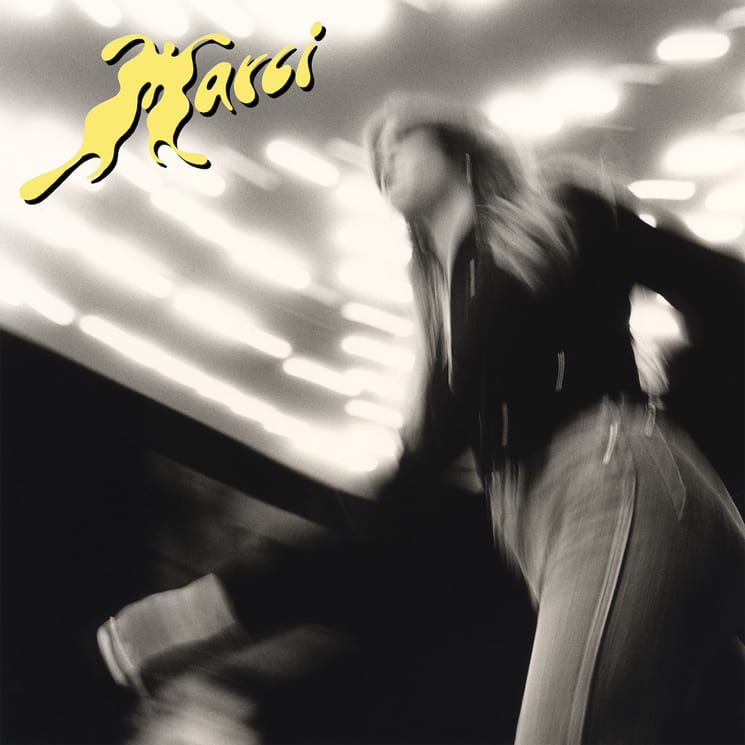When Marta Cikojevic says she's making pop music, you have to understand the implied influence of Montreal on her view of the genre — the Quebecois city often feels like a culturally self-sufficient bubble, and Cikojevic's self-titled solo debut as Marci operates parallel to pop music at large, speaking in musical codes that have largely been left behind by some of today's pop songwriters.
Cikojevic's version of pop — which she likens to a great friend, an intimate confidant — is a complete stranger to the Auto-Tune and trap 808s that have dominated the radio in recent years. In the 11-track uchronia that is Marci, she explores a hybrid informed by Nile Rodgers's contagious grooves as well as '80s R&B and modern indie à la TOPS, for whom Cikojevic plays keys.
As could be expected, Marci shares some of its DNA with the quartet; most notably because TOPS' founding member David Carriere is on double duty here as co-writer and a producer. Surely, fans will recognize his characteristic vintage keyboards and sizzling guitar lines ("Pass Time" being a prime example), as well as a penchant for catchy hooks. But Marci doesn't deserve to be overshadowed by the inevitable comparison, as it ultimately explores a different sonic palette.
While the album evokes the grooves of mid-'70s jazz-influenced rock (think Joni Mitchell circa Court and Spark), there's a modernity to the production that would probably fall closer to contemporaries like Metronomy or HAIM. A few unexpected details — glossy synth arrangements, funky chord changes — amplify that Marci is a riff on the pop of the past rather than a carbon copy.
Similarly to the videos that accompany Marci's first few singles, Cikojevic's songwriting dances on the fine line between emotional earnestness and ironic detachment, which is also very Montreal. It feels like meeting someone at a party for the first time and having them tell you their deepest secrets in the same tone they'd tell you a joke. At times quirky, at others thought-provoking, the lyrics of songs like "Immaterial Girl" and "Entertainment" hold a caustic honesty that leaves the listener in an intriguing limbo — it's probably beside the point to try to figure out whether Cikojevic really means it when she sings "Baby I would die/ Before I tell a lie" on album closer "BB I Would Die."
The music speaks for itself, and on a record that flows effortlessly with an abundance of exciting melodies and production ideas that feel unbound by modern trends, it manages to speak volumes. There's little doubt that Cikojevic and Carriere have crafted an instantly loveable bedroom pop debut that — beyond its anecdotal familiarity — manages to conjure its own particular charm.
(Arbutus Records)Cikojevic's version of pop — which she likens to a great friend, an intimate confidant — is a complete stranger to the Auto-Tune and trap 808s that have dominated the radio in recent years. In the 11-track uchronia that is Marci, she explores a hybrid informed by Nile Rodgers's contagious grooves as well as '80s R&B and modern indie à la TOPS, for whom Cikojevic plays keys.
As could be expected, Marci shares some of its DNA with the quartet; most notably because TOPS' founding member David Carriere is on double duty here as co-writer and a producer. Surely, fans will recognize his characteristic vintage keyboards and sizzling guitar lines ("Pass Time" being a prime example), as well as a penchant for catchy hooks. But Marci doesn't deserve to be overshadowed by the inevitable comparison, as it ultimately explores a different sonic palette.
While the album evokes the grooves of mid-'70s jazz-influenced rock (think Joni Mitchell circa Court and Spark), there's a modernity to the production that would probably fall closer to contemporaries like Metronomy or HAIM. A few unexpected details — glossy synth arrangements, funky chord changes — amplify that Marci is a riff on the pop of the past rather than a carbon copy.
Similarly to the videos that accompany Marci's first few singles, Cikojevic's songwriting dances on the fine line between emotional earnestness and ironic detachment, which is also very Montreal. It feels like meeting someone at a party for the first time and having them tell you their deepest secrets in the same tone they'd tell you a joke. At times quirky, at others thought-provoking, the lyrics of songs like "Immaterial Girl" and "Entertainment" hold a caustic honesty that leaves the listener in an intriguing limbo — it's probably beside the point to try to figure out whether Cikojevic really means it when she sings "Baby I would die/ Before I tell a lie" on album closer "BB I Would Die."
The music speaks for itself, and on a record that flows effortlessly with an abundance of exciting melodies and production ideas that feel unbound by modern trends, it manages to speak volumes. There's little doubt that Cikojevic and Carriere have crafted an instantly loveable bedroom pop debut that — beyond its anecdotal familiarity — manages to conjure its own particular charm.
